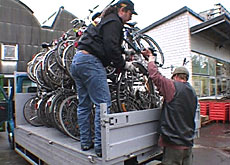Old bikes create new hope

Recycled Swiss bikes are helping to provide a fast track out of the jobless doldrums into the world of paid employment.
The “Drahtesel”, or “Trusty Bike”, scheme near Bern employs out-of-work Swiss people to collect discarded bicycles and make them fit for sale in Africa.
The “Trusty Bike” project provides short-term employment for jobless Swiss people, who collect and recycle discarded bicycles for sale in developing countries.
Participants are able to gain work experience, while engaged on a worthwhile project.
The bikes sold cheaply in mostly African states provide much needed mobility, thus also improving the purchaser’s employment chances.
The project, started up by social worker Paulo Richter ten years ago and run by a foundation in Bern, initially employed four part-timers. Now there are 65 participants.
The workers do not receive wages directly; their income is from unemployment benefit and social welfare.
Richter believes people enjoy taking part in the scheme because, as well as keeping them occupied while they search for paid employment, they are proud to be involved in a project that benefits developing countries.
Any old iron
Some 200,000 bicycles are consigned to the scrap heap in Switzerland every year. Before they get that far, the Trusty Bike workers round them up and sort them out. The more sophisticated models are refurbished and sold on the Swiss market.
The simpler bikes are spruced up, stripped down and shipped out in giant containers. The main recipient is Burkina Faso, but other beneficiaries have included Ghana, Ivory Coast, Mozambique, South Africa, Cuba, Romania and Albania.
In the receiving country, development groups pay local staff to reassemble the bicycles and sell them at SFr50 per piece – a snip of their normal price. The profits from sales pay for the transport costs of SFr7,000 per shipment.
In places where very few people have cars, and public transport leaves a lot to be desired, a bicycle is a useful work tool.
Farmers can transport their crops to market, and traders sell their wares straight from the bike. In Burkina Faso, nurses also use Swiss bikes for house calls to patients, helping to save lives.
Creative buzz
The workshop in Bern is a happy place, full of bustle and friendship. Pop music blares out from speakers in each room, occasionally drowned out by the sound of an electric drill or saw.
The walls are festooned with sculptures and art pieces made from discarded bicycle parts. In one department, necklaces are made from old chains, nuts become rings, and cycle lamps are turned into clocks. Many of these items are sold at markets in Bern.
The workforce is multinational and ranges from teenagers to 60 year olds. A few of the young staff left school without sitting their high school diploma exams, and simply need a bridge into the working world. Many go on to apprenticeships.
Some of the workers are refugees. The project employs social workers to target their needs, and to provide help with learning German and applying for jobs.
Most people at Trusty Bike, such as Raffaele Falletta, have been looking for work for more than a year.
“I’m happy to be here because I have something to do,” Falletta told swissinfo. “After one year of looking for a job you lose your daily rhythm. Now I have to come here every day to meet people and I have the chance to do what I like.”
Falletta, a former Ascom engineer, now makes ingenious clocks and jewellery out of old bicycle parts.
Motivated team
The participants must pass an interview before they can take part in the scheme. They have to show enthusiasm for the environmental and social aims of Trusty Bike.
Paulo Richter told swissinfo: “Up until a few years ago, between 50 – 75 per cent of team members were able to move on to stable, paid employment after taking part in the scheme. These days, the labour market poses more difficulties.”
Sometimes, the normal three-month period of employment at Trusty Bike has to be extended to six months.
Three-wheeler
A new Trusty Bike project is being developed in Bern, which may create extra work opportunities.
Richter’s team is building a three-wheeled, hand-pedalled bike for disabled people, made from old bike parts. They expect the prototype to be ready by the end of this year.
Trusty Bike’s partners in Burkina Faso, Être Comme Les Autres (ECLA), want to give the funky new wheelchairs to employees on a reforestation project. In this way, disabled people, who do not receive state benefits and could not otherwise find paid work, can earn some money watering the newly planted trees.
Paulo Richter hopes that the collaborative project will attract international development funds, enabling the setting up of a second workshop and providing more places for unemployed people here in Switzerland.
swissinfo, Julie Hunt
200,000 Swiss bikes per year are consigned to the scrap heap.
“Trusty Bike” recycles 7,000 of these per year.
One shipping container can hold 650 bikes.
The bikes are sold for SFr50 each in recipient countries, mainly in Africa.
The profits from sales pay for the transport of bikes from Bern to developing countries.

In compliance with the JTI standards
More: SWI swissinfo.ch certified by the Journalism Trust Initiative

You can find an overview of ongoing debates with our journalists here . Please join us!
If you want to start a conversation about a topic raised in this article or want to report factual errors, email us at english@swissinfo.ch.